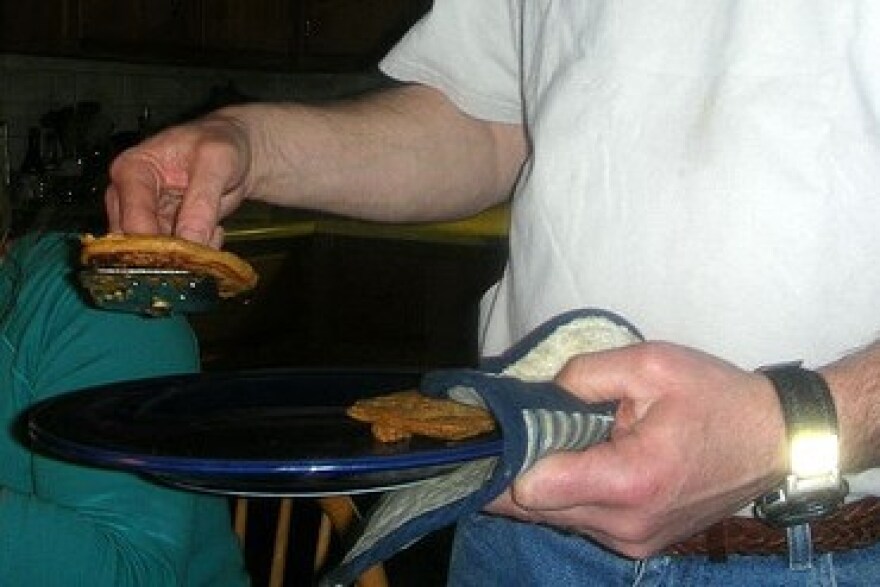On Father's Day, essayist Cari Carlson remembers her dad: from the early moments of safety and comfort he provided to her, through the role reversal in his later years when she took on the mantle of caregiver. (Note: The audio includes an extended version of this essay.)
In my childhood home we could have set our clocks by the sound of my Dad’s chickadee-like whistle, one long note and one short. That’s how he announced he was home every weekday at 5:30 when he came in the back door, walked down the hall to the kitchen, and kissed my Mom on the cheek. “What’s for dinner?” he’d ask. When I heard ice tinkle, I knew food would be on the table in exactly thirty minutes. Like many men of his generation, he liked a drink before dinner but his was special, a Manhattan made with bourbon, sweet vermouth, real maple syrup, and a dash of spring water from Leelanau County in Michigan.
Before we sat down to eat, he took me into the half-bathroom by the kitchen. One at a time he took my hands, held them in the warm water, rubbed soap on them, then gently rinsed and dried them. Sixty years later I can feel his callused hands surround mine as he took care of his little girl.
Only after this nightly ritual did we join the rest of the family at the table. Too young to understand the love that flowed in that soapy water, I felt safe, and somehow knew our tradition meant that all was well in our home.
The summer I turned twelve he took me to the country club and handed me a five-iron. He showed me how to grip it, stood behind me, put his rough hands over mine, and together we swung the club. He stood by while I hit balls into the deep grass, the woods, the pond on the third hole, and never ever lost patience with his uncoordinated daughter. Again and again we started over, his hand covering mine while we practiced the perfect swing.
He was a man of few words, but he loved a good story, especially the one he told many times about his visit to the University of Wisconsin when I was a student. A group of us went out to dine and dance, fathers and daughters, on our special weekend together. At a local club in downtown Madison he overheard, “Look at those college girls, out with men old enough to be their fathers.”
Dad appreciated good food, especially Mom’s cooking, but he had opinions about what she served him for dinner. He loved her pot roast, spaghetti, Salisbury steak, pork chop casserole, and chocolate pie. When he ate at the club after golf, Mom made the food he refused to eat, chicken livers, pizza, beets, asparagus, brussel sprouts, and his least favorite dessert, lemon pie. Every night before he went to bed he ate a bowl of cold milk and crumbled saltines, said it helped him sleep.
Born in 1910, he belonged to a generation of men who didn’t cook. That was woman’s work. That’s why he surprised me when we went up to northern Michigan in the spring when I was in college and he made us dinner and breakfast. When did he learn his way around the kitchen? He was a civil engineer, a wood craftsman, and someone who put the cherry in the Manhattan, not a cook. Dinner, a simple meal, consisted of potato salad brought from home and Dad’s toasted ham and cheese sandwiches. Hardly haute cuisine, yet to me a feast, when we sat down to a beer and the first meal he had made since he married in the thirties.
At breakfast he pulled out flour, oil, buttermilk, eggs, baking powder, and made what would become his specialty, buttermilk pancakes. He immediately mastered the art of the pancake. Crisp brown edges, nicely rounded, medium-thick, yet light, they made a perfect platform for his favorite, maple syrup from Michigan. From that day on, he and Mom never agreed on whether or not to spread butter on the griddle. He put extra oil in the batter, while Mom preferred butter, said it added flavor to the cakes.
The last time I visited him, before he had a debilitating stroke at ninety-two, he made Mom and me buttermilk pancakes. When I saw his hands, wrinkled and gnarly, covered with flour, I wanted to take them in mine and gently wash away the years. In the nursing home when he could no longer speak, I held his hand and reminded him of the years he had washed and dried mine. When he squeezed my hand, I was still his little girl.
Lake Effect essayist Cari Carlson is a freelance writer, outdoor guide in the west and overseas, and a former environmental educator. She lives in Milwaukee.







